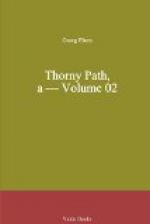Diodoros and Melissa knew every note sung by the Greeks or Egyptians of Alexandria, at this or any other festival, but this melody was strange to them; and when the young man whispered to the girl, “What is it that they are singing?” she replied, as though startled from sleep, “They are no mere mortals!”
Diodoros shuddered; he fancied that the procession was floating above the earth; that, if they had been indeed men of flesh and blood, their steps would have been more distinctly audible on the pavement. Some of them appeared to him to be taller than common mortals, and their chant was certainly that of another world than this where he dwelt. Perhaps these were daimons, the souls of departed Egyptians, who, after a midnight visit to those they had left behind them, were returning to the rock tombs, of which there were many in the stony hills to which this street led. They were walking toward these tombs, and not toward the gate; and Diodoros whispered his suspicion to his companion, clasping his hand on an amulet in the semblance of an eye, which his Egyptian nurse had fastened round his neck long ago with an Anubic thread, to protect him against the evil-eye and magic spells.
But Melissa was listening with such devout attention to the chant that she did not hear him. The fatigue which had reached such a painful climax had, during this peaceful rest, given way to a blissful unconsciousness of self. It was a kind of happiness to feel no longer the burden of exhaustion, and the song of the wanderers was like a cradle-song, lulling her to sweet dreams. It filled her with gladness, and yet it was not glad, not even cheerful. It went to her heart, and yet it was not mournful-not in the least like the passionate lament of Isis for Osiris, or that of Demeter bewailing her daughter. The emotion it aroused in her was a sweetly sorrowful compassion, which included herself, her brothers, her father, her lover, all who were doomed to suffering and death, even the utter stranger, for whom she had hitherto felt no sympathy.
And the compassion bore within it a sense of comfort which she could not explain, or perhaps would not inquire into. It struck her, too, now and then, that the strain had a ring as of thanksgiving. It was, no doubt, addressed to the gods, and for that reason it appealed to her, and she would gladly have joined in it, for she, too, was grateful to the immortals, and above all to Eros, for the love which had been born in her heart and had found such an ardent return. She sighed as she listened to every note of the chant, and it worked upon her like a healing draught.
The struggle of her will against bodily fatigue, and finally against the mental exhaustion of so much bliss, the conviction that her heavy, weary feet would perhaps fail to carry her home, and that she must seek shelter somewhere for the night, had disturbed her greatly. Now she was quite calm, and as much at ease as she was at home sitting with her father, her stitching in her hand, while she dreamed of her mother and her childhood in the past. The singing had fallen on her agitated soul like the oil poured by the mariner on the sea to still the foaming breakers. She felt it so.




